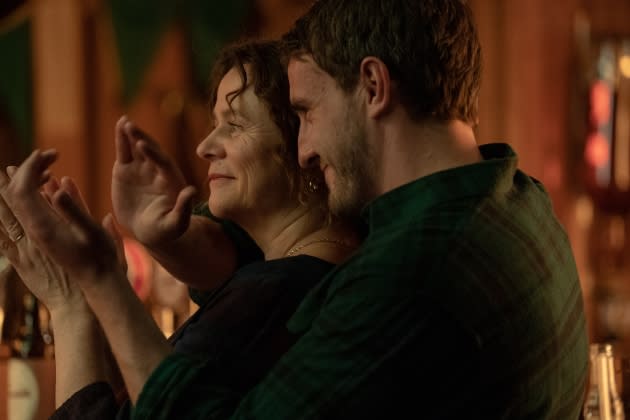Mother Doesn’t Always Know Best in ‘God’s Creatures’
- Oops!Something went wrong.Please try again later.
- Oops!Something went wrong.Please try again later.
- Oops!Something went wrong.Please try again later.

Saela Davis and Anna Rose Holmer’s eerily effective God’s Creatures, starring Emily Watson, opens with an unexpected return. The son of Aileen O’Hara (Watson) has just come home, showing up in their tiny, Irish fishing village unannounced after some time away in Australia. It’s a somber occasion — a local fisherman has just drowned — but for Aileen, especially, this is a joyous moment. Brian (Paul Mescal, of Normal People fame) is something of a mama’s boy. He did not stay in touch while he was away, breaking his mother’s heart, though some part of her must have remained optimistic about his return, because in the meantime, she’s maintained payments on his fishing license — just in case. Brian is a young man and a little impatient. You get the sense that he’s mostly looking for an expeditious way to make money as a laborer, because this is what he starts doing — with his mother’s help — as soon as he gets home, breaking the rules just so to get what he wants, even when it’s dangerous. “Boys will be boys,” his sister Erin (Toni O’Rourke) chides; being a new mother to an infant son herself, she knows all about the O’Hara men and is wary of what she knows. God’s Creatures suggests that she’s right to be.
How close are Brian and his mother? When a police officer calls her into town late one night and informs her an accusation of sexual assault has been made against her son, and that her son claims to have been home with her that night, she does not hesitate to be Brian’s alibi. She doesn’t even have to think about it. In fact, she and Brian were together, but they were out at the local pub, not at home, as he’s claimed. Aileen knows the woman who’s made the accusation (played by The Nightingale star Aisling Franciosi). She works with her and has in fact known her since she was a child. So there’s no disputing the truth, here, a fact that the God’s Creatures screenplay invisibly labors to make clear. Just as it’s clear that Aileen fully knows that she saw her son chatting up the woman at the bar that night.
God’s Creatures is not about the question of “if” the assault happened, even as it goes out of its way not to depict it firsthand, not even in a flashback. It manages to leave that much unknown but unambiguous — perhaps because it knows that the question of “if” bears little relevance to the fact that Aileen instinctively plays along with her son’s alibi. Without thought or hesitation, without confusion or questioning, Aileen lies.
More from Rolling Stone
Woman Who Helped Con Martha's Vineyard Migrants Was Ex-Military: Reports
Nazis, Seditionists, and Gay Vampire Porn: Rachel Maddow Reveals Her New Podcast 'Ultra'
What makes God’s Creatures a psychological drama, what allows it to remain the low-key, tense but miniature character study that it is, is that its focus on Aileen’s choice, and on the relationships in her life with men and women, and on the things that happen when no one is looking, avoids rendering this story a thriller. If anything, it’s when the film veers in the direction of a thriller, toward the end, that it feels at its weakest and most drastic. The cinematography (by the talented Chayse Irvin) and mum’s-the-word acting style are already doing enough. This is a world carved out of blue hues, rising tides, and silence. Watson — in a great performance — spends most of the movie looking, not speaking. And the film is always observing too, evoking, on the one hand, a shadowy sense of privacy and secrets while, on the other, slowly zooming in and out as if performing psychological x-rays.
God’s Creatures is interested in Aileen’s instinct to lie for her son — interested, perhaps most of all, in letting us watch Aileen wither from inside as the effect of her lie takes shape in their small village, leading to ostracization and distrust even within her own family. But the movie is also, usefully, concerned with Brian’s own instinct — that is, his automatic resort to his mother, using the one person in this story whose testimony could condemn him as his sole alibi. His trust in his mother’s support is unwavering. The movie’s pervasive, brooding quiet and its clear fascination with the quietly observant Aileen have a way of damning that trust from the start. It doesn’t quite feel right, for reasons you cannot totally place as you watch.
The worlds of men and women in this village — linked worlds, but plainly distinct, as this movie depicts them — may have something to do with that. The men all work as fishermen, the women all work in the factory, but much of what God’s Creatures has to say on this subject is in the margins — a slap from Aileen’s ailing father-in-law, for example, that’s never discussed again but seems to be the kind of violence that every woman in this movie understands, or the emphasis on filming women talking amongst themselves during smoke breaks, telling each other things that the men in their lives either don’t need to hear or wouldn’t understand.
Maybe it’s all of this that makes Aileen’s internal crisis, which hinges on a potential change of mind, feel both harrowing and completely inevitable. God’s Creatures is a quiet movie, but its emotional drift is violent; Watson and Franciosi are particularly effective at giving us women being swept up into the currents. “It seems like the whole world has turned upside down,” Aileen eventually says. But her daughter — and the movie — correct her. It’s Aileen who’s changing. The rest of the world is as it ever was.
Best of Rolling Stone
